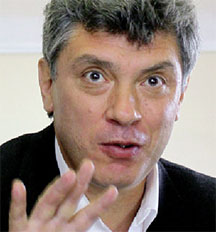MOSCOW, (Reuters) – Two Russian opposition parties agreed yesterday to run on a joint platform in 2016 parliamentary elections, aiming to make a first step in uniting fractious Kremlin adversaries after the killing of party leader Boris Nemtsov.
Critics of President Vladimir Putin say he bears ultimate political responsibility for the gunning down of Nemtsov, a former deputy prime minister, on Feb. 27. The Kremlin denies stifling dissent and Putin has urged law enforcement bodies to investigate the case in full.

RPR-Parnas, co-founded by Nemtsov, and Party of Progress, led by anti-graft blogger Alexei Navalny, said they would also run together in local elections due in some regions this year.
“At this difficult time, we call on broad public and civic forces … to consolidate on a common platform of rejection of lies, corruption and aggression, suppression of economic and civil liberties and for building a democratic state in our country,” they said.
The leader of a small rightist opposition party said he would also join, and the parties hope for further support.
Previous attempts to unite the opposition have failed, partly because groups whose ideology spans from left to right agree on little more than the need to oust Putin and fight corruption.
Opposition activists led street protests in 2011 and 2012 but the rallies lost momentum as Putin started a third presidential term and tightened his grip on power.
Navalny and other critics of the Kremlin have faced court cases and convictions on charges they denounce as political, while other activists have been driven into exile.
“There are about 25 percent of people sharing such views in Russia but their influence would be much bigger if it were a fair game,” said Lev Gudkov, the head of the Levada sociological research centre.
“The Kremlin fully controls TV. Regular people simply don’t know what the opposition is doing. Their capabilities and those of the Kremlin’s propaganda are incomparable.”









